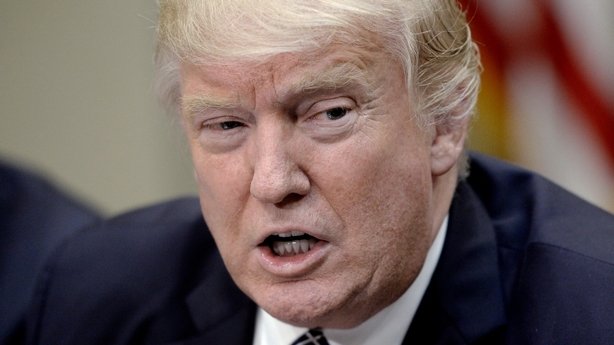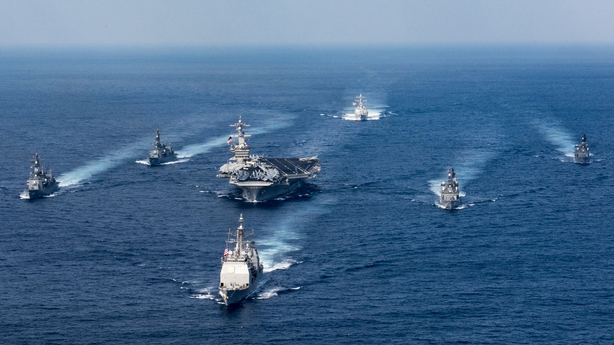US President Donald Trump has said he would not rule out meeting North Korean leader Kim Jong-Un, despite weeks of tough talk against the regime.
"If it would be appropriate for me to meet with him I would absolutely. I would be honoured to do it," Mr Trump said in an interview with Bloomberg.
Tensions with North Korea have soared in recent weeks, amid Pyongyang's series of provocative missile tests.
The Trump administration has repeatedly warned "all options are on the table" when it comes to dealing with North Korea's missile and nuclear programmes, but it also stressed last week it is open to direct talks with Pyongyang.
"If it's under the, again, under the right circumstances. But I would do that," Mr Trump said.

The White House said North Korea would need to clear many conditions before a meeting could be contemplated.
White House spokesman Sean Spicer told reporters the US would need to see North Korea's provocative behaviour ratcheted down immediately.
Meanwhile, North Korea has suggested that it will continue its nuclear weapons tests.
It said it will bolster its nuclear force "to the maximum" in a "consecutive and successive way at any moment" in the face of what it calls US aggression and hysteria.
Mr Trump last week said a "major, major conflict" with North Korea is possible over its nuclear and ballistic missile programmes.
China had said the situation on the Korean peninsula could escalate or slip out of control.
In a show of force, the US has sent the nuclear-powered USS Carl Vinson aircraft carrier group to waters off the Korean peninsula to join drills with South Korea to counter a series of threats of destruction from North Korea, formally known as the Democratic People's Republic of Korea (DPRK).

"Now that the US is kicking up the overall racket for sanctions and pressure against the DPRK, pursuant to its new DPRK policy called 'maximum pressure and engagement', the DPRK will speed up at the maximum pace the measure for bolstering its nuclear deterrence," a spokesman for North Korea's foreign ministry said in a statement carried by its official KCNA news agency.
North Korea's "measures for bolstering the nuclear force to the maximum will be taken in a consecutive and successive way at any moment and any place decided by its supreme leadership," the spokesman said.
Reclusive North Korea has carried out five nuclear tests and a series of missile tests in defiance of UN Security Council and unilateral resolutions.
It has been conducting such tests at an unprecedented rate and is believed to have made progress in developing intermediate-range and submarine-launched missiles.
It test-launched a missile on Saturday which Washington and Seoul said was unsuccessful, but which nevertheless drew widespread international condemnation.
In a TV interview with CBS that aired yesterday, Mr Trump described North Korean leader Kim Jong-un as a "pretty smart cookie".
He said Mr Kim had assumed power at a young age, despite dealing with "some very tough people".
"People are saying: 'Is he sane?' I have no idea but he was a young man of 26 or 27 when his father died. He's dealing with obviously very tough people, in particular the generals and others.
"And at a very young age, he was able to assume power. A lot of people, I'm sure, tried to take that power away, whether it was his uncle or anybody else. And he was able to do it. So obviously, he's a pretty smart cookie."
Yesterday, Mr Trump spoke with leaders of Singapore and Thailand about the threat North Korea poses in Asia.
"We need cooperation at some level with as many partners in the area as we can get to make sure that we have our ducks in a row," US Chief of Staff Reince Priebus told ABC's This Week.
The US president spoke to Philippine's President Rodrigo Duterte last Saturday about North Korea and his outreach to regional leaders aims to get "everyone in line backing up a plan of action" if the situation in North Korea deteriorates, Mr Priebus said.
He added that Mr Trump was in regular contact with Japanese Prime Minister Shinzo Abe and that he had become "very close" to Chinese President Xi Jinping.
"There is nothing right now facing this country and facing the region that is a bigger threat than what is happening in North Korea," the White House chief of staff said.
Mr Priebus said the planned conversations were prompted by the "potential for nuclear and massive destruction in Asia" and eventually in the US.

